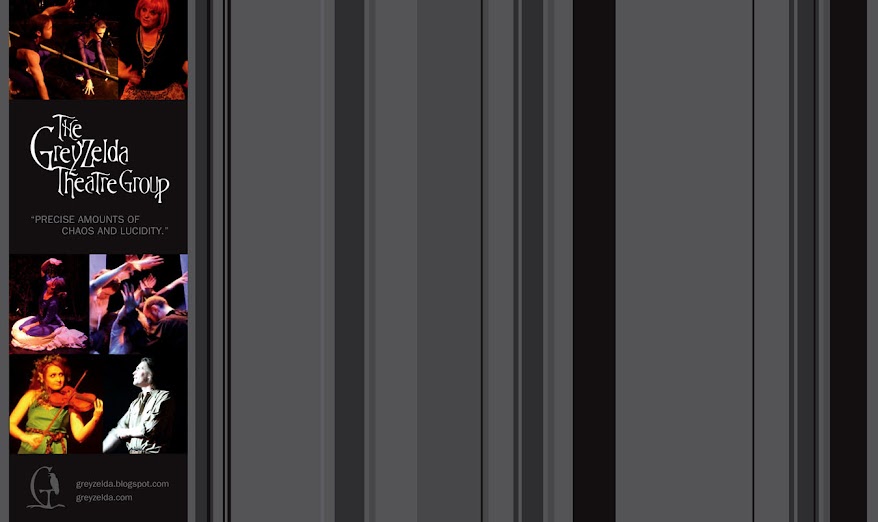Remember when I said that I was going to try to post a lesson from William Ball's A Sense of Direction every Friday back in October?
Yeah .... about that ....
Here's another one for you ... just say "yes" to Intuition. And Michigan.
INTUITION
"Intuition is the most important component of the creative process. Intuition is perfect. My intuition is perfect. Your intuition is perfect. All intuition is perfect. Spontaneous right thought and automatic right and appropriate action become manifest through the apparatus of intuition. The intuition is the uncluttered avenue by which perfection makes itself available to human perception. Intuition is the path by which perfect Universe travels into individual human experience. It is the most efficient mechanism by which 'absolute' becomes expressed in the 'relative.'
It is generally agreed that the work of the human brain falls into two major classifications. Under the term 'critical brain' we will include aspects of thought such as rationality, judgment, decision-making, analytical process, exactitude, self-discipline, value, standards, selection, memory, willpower, logic, and discretion. Some psychologists have postulated that these characteristics are housed in the 'left brain.'
Under the term 'intuitive brain' we will include characteristics such as emotion, hunches, flights of fancy, imagination, sensory experience, parapsychological experience, instinct, genius, inspired ideas, dreams, daydreams, aspirations, humor, caprice, playfulness, artistic sensitivity, and illogical responses. These are the aspects that some contemporary psychologists group together as representing the action of the 'right brain.' The intuitive brain is like an oversized retarded child playing with a bauble and mumbling incoherent phrases. It acts like a baby, it wants its own way in everything, it requires perpetual attention, it unreliable and completely unreasonable. But within that moronic child lives the brilliant composer of dreams. Dreams are arrangements of poetically perfect, preciously interlocking, self-referential symbols. There is a quality of perfect creation in a dream. That perfect poetic creativity is the work of the little genius, or the 'little professor,' sitting in the intuitive brain. In other words, the intuitive brain is the home of the amorphic moron who is selfish, moody, and irresponsible, but who, on certain occasions, is inspired with flashes of brilliance and unassailably right thought, flawlessly appropriate action, and sublime clarity of vision. Intuition is capable of inspiring one with instant truth, with absolute and perfect clarity. It is ironic that intuition, the source of inspiration and genius, should spend most of its time behaving 'like a slob.'
Now, critical brain usually attempts to discipline the intuitive brain. Critical brain decides to give up cigarettes and chocolates. Critical brain resolves to do the right thing. Being logical and decisive, it is always trying to persuade intuitive brain to 'behave'. Intuitive brain has bad manners. Intuitive brain laughs in church. It is a common misbelief in Western thought that left brain can achieve everything, especially when it is able to tyrannize right brain. But in the creative process, we seek to encourage the intuitive brain. We have to make friends with intuition. We have to let intuition know that it will be trusted at every moment, and that whenever intuition feeds us something, we are going to respect it and use it no matter what our critical faculties think.
Now, a director gives this message to the actor: 'I will use your creative thoughts no matter what they are. Any thoughts that you give me I will use.' Intuition, the moronic child, hears the message. The wayward right brain will send down some insolent and inappropriate idea just to test the director - to prove the director is a liar. The director patiently uses the idea no matter how clumsy and coarse it may seem. Now, when the actor's intuition realizes that his coarse suggestion has actually been put to use, the intuition mutters, 'I can't believe he used that moronic idea. I'll send him down a worse one and see what he makes of that!' The director unquestioningly uses the second idea that the actor's intuitive process delivers, thus sending the message back to intuition, 'You have suggested two ideas and both ideas have been used.' The intuition falls into careful reflection, mumbling, 'What is this? A game? A trick? Or could there be a pattern here?' When the director uses the third suggestion of the actor's intuition without modifying, questioning, or quibbling, the intuition locks into a very important realization. This realization will significantly affect the work of the director in relation to the actor's creative intuition."

No comments:
Post a Comment